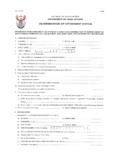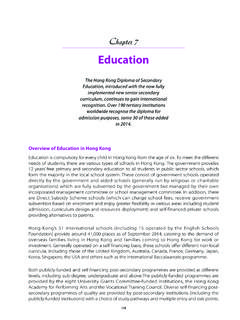Transcription of Education - southafrica-newyork.net
1 EducationSouth Africa yearbook 2015/16133 EducationSouth Africa yearbook 2015/16 EducationSouth Africa yearbook 2015/16133 EducationSouth Africa yearbook 2015/16134 Basic educationThe Department of Basic Education (DBE) deals with all schools from Grade R to Grade 12, including adult literacy programmes. The aim of the DBE is to develop, maintain and support a South African school Education system for the 21st and policiesEducation in South Africa is governed by the following key policies and legislation: The fundamental policy framework of the Ministry of Basic Education is stated in the Ministry s first White Paper on Education and Training in a Democratic South Africa: First Steps to Develop a New System, published in February 1995.
2 The National Education Policy Act (Nepa), 1996 (Act 27 of 1996) brought into law the policies, and legislative and monitoring responsibilities of the Minister of Education , as well as the formal relations between national and provincial authorities. It laid the foundation for the establishment of the Council of Education Ministers (CEM), as well as the Heads of Education Departments Committee (HEDCOM), as intergovernmental forums that would collaborate in the development of a new Education system. Nepa of 1996, therefore, provided for the formulation of national policy in general, and Technical and Vocational Education and Training (TVET) policies for curriculum, assessment, language and quality assurance.
3 The South African Schools Act (SASA), 1996 (Act 84 of 1996) is aimed at ensuring that all learners have access to quality Education without discrimination, and makes schooling compulsory for children aged seven to 15. It provides for two types of schools namely independent and public schools. The provision in the Act for democratic school governance, through school-governing bodies (SGBs), has been implemented in public schools countrywide. The school-funding norms, outlined in SASA of 1996, prioritise redress and target poverty regarding the allocation of funds for the public-schooling system.
4 The Adult Basic Education and Training (ABET) Act, 2000 (Act 52 of 2000) regulates ABET; provides for the establishment, governance and funding of public adult learning centres; provides for the registration of private adult learning centres; and provides for quality assurance and quality promotion in ABET. SASA of 1996 was amended by the Education Laws Amendment Act, 2005 (Act 24 of 2005), which authorises the declaration of schools in poverty-stricken areas as no-fee schools , and by the Education Laws Amendment Act, 2007 (Act 31 of 2007), which provides for the functions and responsibilities of school principals.
5 The Employment of Educators Act, 1998 (Act 76 of 1998) regulates the profes-sional, moral and ethical responsibilities of educators, as well as teachers competency requirements. The Act and the South African Council for Educators (SACE) regulate the teaching corps. The design of the National Qualifications Framework (NQF) was refined with the publication of the Higher Education Qualifi-cations Framework in the Government Gazette in October 2007, to provide 10 NQF levels. The NCS grades R to 12 replaced the policy document, A R sum of Industrial Programmes in Schools, Report 550 (89/03).
6 The Education White Paper on ECD (2000) provides for the expansion and full partici-pation of five-year-olds in pre-school Grade R Education by 2010, and an improvement in the quality of programmes, curricula and teacher development for birth to four-year-olds and six- to nine-year-olds. The Education White Paper 6 on Inclusive Education (2001) describes the DBE s intention to implement inclusive Education at all levels in the system by 2020. The system will facilitate the inclusion of vulnerable learners and reduce the barriers to learning through targeted support structures and mechanisms that will improve the retention of learners in the Education system, particularly learners who are prone to dropping out.
7 The Education Laws Amendment Act, 2002 (Act 50 of 2002) set the age of admission to Grade 1 as the year in which the child turns seven. However, the school-going age of Grade 1 was changed to age five, if children turned six on or before 30 June in their Grade 1 year. The Umalusi Council sets and monitors standards for general and TVET in South Africa, in accordance with the NQF Act, 2008 (Act 67 of 2008), and the General and FET Quality Assurance Act, 2001 (Act 58 of 2001). The South African Standard for Principalship Policy was approved by the CEM in 2015.
8 The policy was submitted to the Performance Monitoring and Evaluation unit in The Presidency to undergo a Socio-Economic Impact Assessment and Quality Assessment. The policy was gazetted on 18 March Africa yearbook 2015/16135 Action Plan to 2019: Towards the Realisation of Schooling 2030 This Sector Plan is an update to the Action Plan to 2014. It is a reflection of how far the country has come in terms of planning service delivery, not just in basic Education but in government as a whole. The sector plan encapsulates the department s response to the priorities, targets and programmes articulated in the National Development Plan (NDP), 2030; and provides a detailed five year plan and 15-year targets and programmes for the whole Basic Education sector.
9 The new Sector Plan replaces the 2014 Action Plan; which detailed programmes that the department had initiated in the previous cycle; and which were widely consulted in the Basic Education Sector. In the next few years, the DBE will build on its successes in attaining the Millennium Developmental Goals (MDGs) for access, participation, and gender equity. In the post-2015 period, the emphasis will be on quality of schooling outcomes, and on better preparation of young people for the life and work opportunities after they leave school.
10 The department has, to this end, developed three streams of curricula (academic, vocational and technical), which address the diverse needs of young people for learning and development in all schools. The DBE is working with the Department of Higher Education and Training (DHET) to better influence the quality and preparation of teachers and ultimately, learners, in critical subjects including mathematics, science and technology, and the African languages. This plan has 27 goals. Goals 1 to 13 deal with outputs that the department wants to achieve in relation to learning and enrolments.










